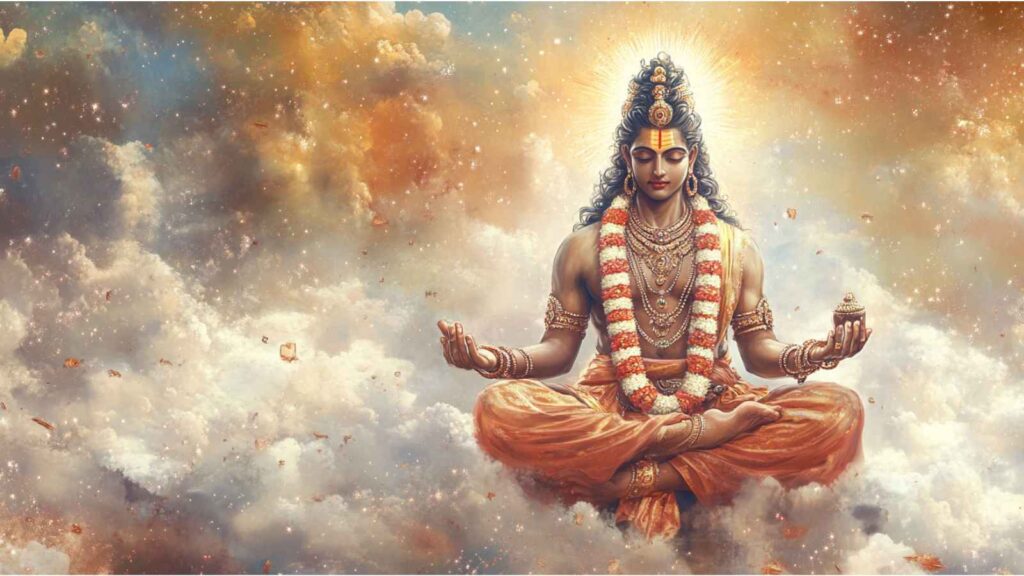In Hindu philosophy, karma is a fundamental concept that underscores the law of cause and effect. It posits that every action, thought, and intention contributes to shaping one’s destiny. Understanding karma empowers individuals to take responsibility for their actions and guides them toward a path of righteousness and spiritual liberation.Hindu MythologyJai Shri Hanuman Chalisaa
Read More About sacred texts
Understanding Karma in Hinduism

Definition and Etymology
The term karma originates from the Sanskrit root kri, meaning “to do” or “to act.” In Hinduism, karma refers to the universal principle of cause and effect, where every action has corresponding consequences. This principle emphasizes that individuals are the architects of their own fate through their actions.thedivineindia.com+2Hindu Mythology+2astrolaabh.in+2
Types of Karma
- Sanchita Karma: The accumulated karma from past lives.
- Prarabdha Karma: The portion of sanchita karma that is currently influencing one’s present life.
- Kriyamana Karma: The karma being created in the present life, which will affect future experiences.
Understanding these types helps individuals comprehend how past actions influence the present and how current actions shape the future.
Karma and Responsibility
Karma emphasizes personal responsibility. It teaches that individuals have the power to influence their destiny through conscious choices. By aligning actions with ethical and moral principles, one can cultivate positive karma, leading to spiritual growth and eventual liberation (moksha).Hindutone
Karma in Hindu Scriptures

The Bhagavad Gita
The Bhagavad Gita, a central text in Hindu philosophy, delves deeply into the concept of karma. Lord Krishna advises Arjuna to perform his duty without attachment to outcomes:Hindu Mythology+1Reality Pathing+1
“You have the right to perform your prescribed duties, but you are not entitled to the fruits of your actions.”
— Bhagavad Gita 2.47
This verse underscores the importance of selfless action and detachment from results.
The Upanishads
The Upanishads explore the metaphysical aspects of karma, discussing how actions influence the soul’s journey and the cycle of rebirth. They emphasize that understanding the self (Atman) and its unity with the ultimate reality (Brahman) leads to liberation from the cycle of karma.Sacred Texts
The Interplay of Karma and Dharma
Dharma, or righteous duty, is integral to the concept of karma. Performing one’s dharma aligns actions with cosmic order, generating positive karma. Neglecting dharma leads to negative karma, perpetuating the cycle of birth and death (samsara).
Karma and Reincarnation
In Hinduism, karma is intrinsically linked to reincarnation. The soul (Atman) undergoes a cycle of births and deaths, with karma determining the circumstances of each life. Positive karma can lead to favorable rebirths, while negative karma can result in challenging life situations.
Misconceptions About Karma
- Karma is immediate: While some karmic effects are immediate, others may manifest in future lives.
- Karma is punishment: Karma is not punitive but educative, guiding souls toward spiritual evolution.
- Karma is fate: Karma emphasizes free will; individuals can change their destiny through conscious actions.Peoples Quotes
Applying Karma in Daily Life
- Mindful Living: Being aware of thoughts and actions to ensure they align with ethical principles.
- Selfless Service: Engaging in actions without expecting rewards.
- Continuous Learning: Reflecting on experiences to understand karmic patterns and make better choices.
Visual Representation
To create an AI-generated image representing karma:
Prompt: “A symbolic depiction of the cycle of karma in Hinduism, illustrating the interconnectedness of actions and their consequences, with elements like the wheel of samsara, scales of justice, and a path leading toward enlightenment.”
Suggested Tools: Midjourney, DALL·E, or Stable Diffusion.
Conclusion
Karma is a profound principle in Hinduism that emphasizes the power of actions in shaping one’s destiny. By understanding and applying the concept of karma, individuals can lead lives of responsibility, ethical integrity, and spiritual fulfillment. Embracing karma encourages self-awareness and guides souls toward liberation.Hindutone


